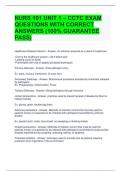NURS 101 UNIT 1 – CCTC EXAM
QUESTIONS WITH CORRECT
ANSWERS (100% GUARANTEE
PASS)
Healthcare-Related Infection - Answer- An infection acquired as a result of healthcare
-Cost to the healthcare system = $4.5 billion/year
-Leading cause of death
-Preventable with use of aseptic principles/techniques
Primary defenses - Answer- limits pathogen entry.
Ex. tears, mucous membrane, GI tract, skin.
Secondary Defenses - Answer- Biochemical processes activated by chemicals released
by pathogens
Ex: Phagocytosis, Inflammation, Fever
Tertiary Defenses - Answer- killing pathogens through immunity
contact precautions - Answer- practices used to prevent spread of disease by direct or
indirect contact
Ex. gloves, gown, double bag linen.
Airborne precautions - Answer- Methods of infection control that must be used for
patients known or suspected to be infected with pathogens transmitted by airborne
droplet.
Ex. special room, mask, face shield, no sweeping or shaking sheets.
Droplet precautions - Answer- Methods of infection control that must be used for
patients known or suspected to be infected with pathogens transmitted by large particle
droplets expelled during coughing, sneezing, talking, or laughing.
Protective isolation - Answer- technique used to provide care to patients requiring
protection from organisms in the environment
, Ex. no carpet, wet-dusting daily, special ventilation.
Factors affecting hygiene - Answer- culture, religion, environment, developmental level,
health and energy, personal preferences
Factors influencing personal hygiene - Answer- culture, religion, environment,
developmental level, health and energy, personal preference
Nurse Assessment - Answer- confirm chief complaint, review allergies, brief past
medical history
look at them and watch them
ask questions
Nursing Roles - Answer- caregiver, communicator, teacher / educator, counselor,
leader, researcher, advocate, collaborator.
primary services - Answer- directed toward keeping the patient well by preventing
illness and promoting illness-prevention activities
secondary services - Answer- directed toward early diagnosis and treatment of illness,
disease, and injury
tertiary services - Answer- long-term rehabilitation services and care for the dying
critical thinking - Answer- reflective thinking process that requires an individual to collect
information, analyze that information, and consider the options for action.
Ex: Analyzing a patient and determining the care they need
cognitive learning - Answer- The storage and recalling of information
Psychomotor skills - Answer- hands on skills that require thinking and doing
affective learning - Answer- involves feelings, beliefs, and ideals
example: a client listens to the nurse explain life changes necessary to manage
diabetes and then discusses feelings regarding the diagnosis
Five Rights - Answer- right person
right task
right circumstances
right direction/communication
right supervision/evaluation




